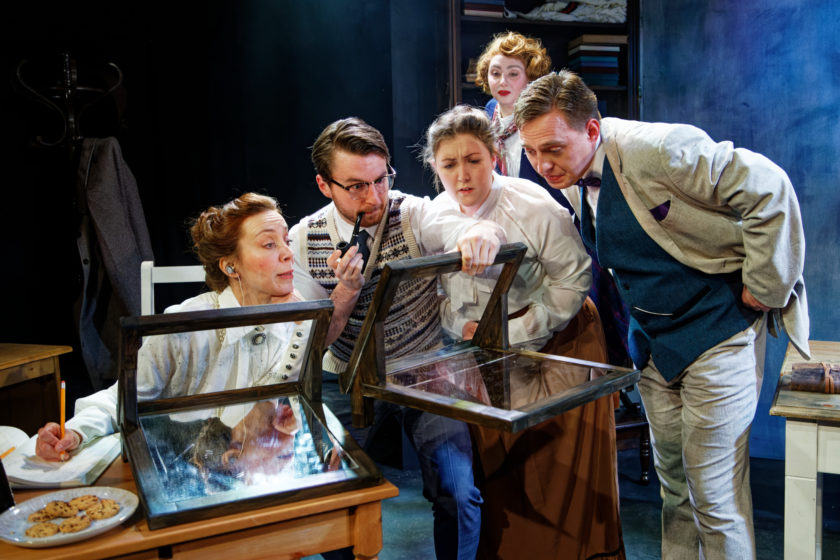Jack Studio Theatre – until 19 February 2022
4****
Reviewed by Claire Roderick
The second play in Arrows & Traps Dyer’s Hand season charts Cecilia Payne’s ground-breaking academic career at Harvard University. The touching nurturing relationship between Payne and Gustav Holst that frames the first play in the season bookends this play, tempting any audience members who have not yet seen Holst to book their tickets straight away.
Beginning with a scene that will raise the audience’s hackles, the brave new world Cecilia (Laurel Marks) finds herself in when she arrives at Harvard – no servants, no outdated rules, women working in the sciences – is represented by jazz and blues music. This shiny sense of empowerment soon dissipates as Harvard’s attitude to women scientists is revealed – to let them work quietly with no acknowledgement. Allowed to research the stellar spectra, Cecilia discovers that the stars are composed mainly of Hydrogen and Helium, but her conclusions contradict the findings and theories of the scientific establishment, and she is told to label her findings spurious.
Writer and director Ross McGregor excels in writing strong women characters without idealising them, and in this play it is very clear who are the smartest people in the room. Laurel Marks’ adult Cecilia, with shades of the emotional and social outcast schoolgirl beneath the frustrated but stoic academic, is finely nuanced and utterly charming. Lucy Ioannou and Cornelia Baumann, as Adelaide Aimes and Annie Jump Cannon, are the dream team of support systems, with Ioannou’s lively and extraverted Aimes bringing Cecilia out of her shell, and Baumann’s Cannon championing her cause amongst killer one liners. Cecilia’s ground-breaking future being marked by Cecilia’s gradual costume change from resembling Cannon in Edwardian dress to more progressive modern dress is a lovely touch. Edward Spence is lots of fun as Donald Menzel, Toby Wynn-Davies, so tender as Holst, is a calm and controlling bully as Russell, and Alex Stevens veers between loveable and slappable as Harlow Shapley. The scene where the two convince Cecilia to alter her thesis is skin-crawling good, with their reasonable sounding arguments and emotional blackmail becoming more and more targeted at Cecilia’s weak spots.
This is a more linear play than Holst, but the design by Odin Corie, Jonathan Simpson, Andrew Lax and Douglas Baker still provides moments of magic. The title cards are still there to keep track of events and the musical choices are wonderful. Even in a play about science, there is time for some beautiful and emotional movement scenes. There is lots of dialogue about astronomy, but it is all vital to the plot, peppered with one-liners and balanced well with Cecilia’s personal story.
The Stars Are Fire is an outstanding tribute to Cecilia Payne’s career and legacy – an inspirational story performed by a heavenly cast with wit, charm and passion

